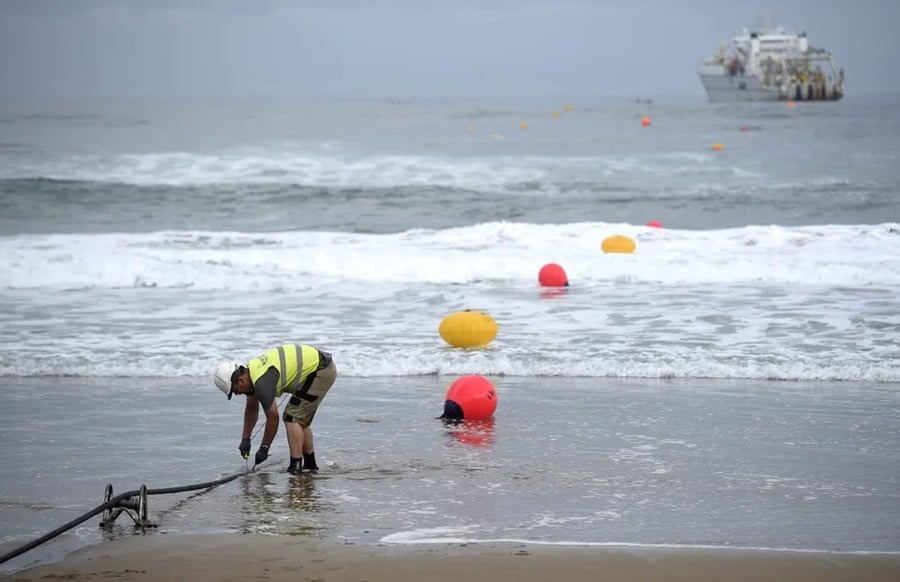Strong legislation needed to protect submarine cables in our waters
Strong legislation needed to protect submarine cables in our waters (nst.com.my)
By Dr Su Wai Mon @ Faridah, Dr Mohd Hazmi Mohd Rusli – November 19, 2021 @ 1:37am

OUR daily lives in the 21st century heavily rely on the Internet and information technology.
About 95 per cent of Internet connectivity is cable-based, which transmits signals from submarine cables that are typically buried within the sea bed, which could be within or beyond national jurisdictions of states.
In 2010, the United Nations described submarine communication cables as “critical communication infrastructure” and “vitally important to the global economy and the national security of all states”.
Up to last year, “a telecommunications market research and consulting firm believes there were more than 1.2 million kilometres of submarine cables in service globally, enough to go around the world about 30 times”.
Being a critical infrastructure, submarine cables deserve a high level of protection.
It is estimated that global submarine cable capacity will grow by 143 per cent next year.
Like others in the region, Malaysia is one of the major communication hubs with several cable landing stations.
There are two local corporations managing these facilities, which are members of the International Cable Protection Committee — Telekom Malaysia and Optic Marine Services Sdn Bhd, a fibre-optic cable manufacturer.
Malaysia is connected to 22 international cables through six cable landing stations. It is noteworthy to mention that many essential services are performed through submarine cables.
They include money transfers, as well as transfer of sensitive data, like political and military information. It is estimated that roughly US$10 trillion of economic activity moves through submarine cables every day.
Given the dependence on such cables, from personnel management to communications, fiscal matters, military and security operations, it’s also surprising to many that almost all the global network of submarine cables are privately owned and maintained.
Submarine cables are vulnerable to various threats, including divers, anchors, submarines and fishing trawlers.
Some organisations and states are trying to address these threats in various ways. New Zealand and Australia have adopted a national legislation on submarine cable protection.
Disruptions to Internet services caused by the negligence or intentional damage to these cables, and illegal access by foreign entities would spell disaster for national security, as well as the economy and social welfare of a nation.
Therefore, submarine cable protection has to be ensured.
Taking into consideration the potential interference on this maritime infrastructure, a number of recommended follow-up activities have been identified, including national action plans to enhance the resilience of these cables.
Submarine cables in Malaysia are governed under the Continental Shelf Act 1966, Exclusive Economic Zone Act 1984, Penal Code, Merchant Shipping Ordinance 1952 and the Communications and Multimedia Act 1998.
However, there is yet to be a comprehensive legislation on submarine cable protection in Malaysian waters.
Consequently, the specific legislation is crucial in sustaining the nation’s information and communication security.
The only exception that international law accords to foreign ships in the territorial seas of other states is the right of innocent passage.
The right of innocent passage allows foreign ships to enter the territorial sea of a coastal state without prior permission as long as the passage is continuous and expeditious. But the passage could be suspended if it is detrimental to the security of the coastal state concerned.
Depending on the cabotage policies of coastal states, the right of innocent passage usually does not include maintenance of submarine cables by foreign vessels.
Malaysia had, in March 2019, approved an exemption for submarine cable repair vessels after complaints of delays in the repair of undersea cables by tech giants.
However, this exemption has been reversed with the aim of developing local talent.
The question is, would Malaysia “sacrifice” its sovereignty over the growth of information technology?
As the world is moving towards a data-driven era, this is something worth pondering upon.
The first writer is a senior lecturer at the Faculty of Law, Universiti Malaya, while the second writer is an associate professor at the Faculty of Syariah and Law, Universiti Sains Islam Malaysia
